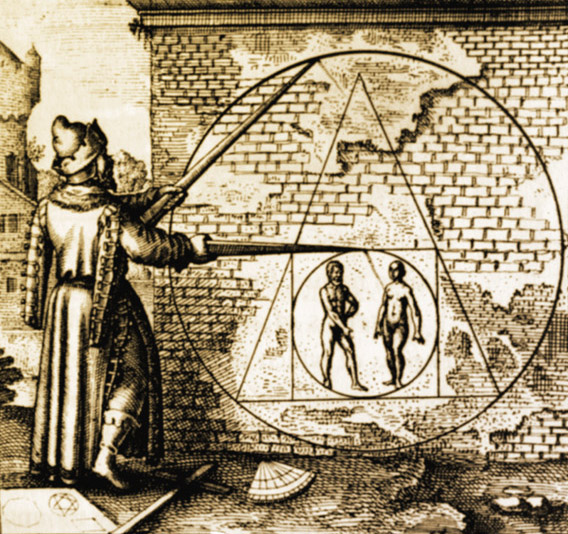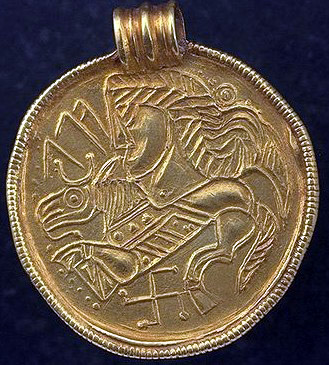|
Divination
Divination () is the attempt to gain insight into a question or situation by way of an occultic ritual or practice. Using various methods throughout history, diviners ascertain their interpretations of how a should proceed by reading signs, events, or omens, or through alleged contact or interaction with supernatural agencies such as ghost, spirits, gods, god-like-beings or the "will of the universe". Divination can be seen as an attempt to organize what appears to be random so that it provides insight into a problem or issue at hand. Some instruments or practices of divination include Tarot card reading, Tarot-card reading, Runic magic, rune casting, Tasseography, tea-leaf reading, automatic writing, water scrying, and psychedelics like psilocybin mushrooms and DMT. If a distinction is made between divination and fortune-telling, divination has a more formal or ritualistic element and often contains a more social character, usually in a religion, religious context, as se ... [...More Info...] [...Related Items...] OR: [Wikipedia] [Google] [Baidu] |
Methods Of Divination
Methods of divination can be found around the world, and many cultures practice the same methods under different names. During the Middle Ages, scholars coined terms for many of these methods—some of which had hitherto been unnamed—in Medieval Latin, very often utilizing the suffix when the art seemed more mystical (ultimately from Ancient Greek , , 'prophecy' or 'the power to prophesy') and the suffix when the art seemed more scientific (ultimately from Greek , , 'to observe'). Names like '' drimimantia'', '' nigromantia'', and '' horoscopia'' arose, along with other pseudosciences such as phrenology and physiognomy. Some forms of divination are much older than the Middle Ages, like haruspication, while others such as coffee-based tasseomancy originated in the 20th and 21st centuries. The chapter "How Panurge consulteth with Herr Trippa" of '' Gargantua and Pantagruel'', a parody on occult treatises of Heinrich Cornelius Agrippa, contains a list of over two dozen "m ... [...More Info...] [...Related Items...] OR: [Wikipedia] [Google] [Baidu] |
Supernatural
Supernatural phenomena or entities are those beyond the Scientific law, laws of nature. The term is derived from Medieval Latin , from Latin 'above, beyond, outside of' + 'nature'. Although the corollary term "nature" has had multiple meanings since the ancient world, the term "supernatural" emerged in the Middle Ages and did not exist in the ancient world. The supernatural is featured in folklore and religious contexts, but can also feature as an explanation in more secular contexts, as in the cases of superstitions or belief in the paranormal. The term is attributed to non-physical entity, non-physical entities, such as angels, demons, gods and ghost, spirits. It also includes claimed abilities embodied in or provided by such beings, including Magic (supernatural), magic, telekinesis, levitation (paranormal), levitation, precognition and extrasensory perception. The supernatural is hypernymic to religion. Religions are standardized supernaturalist worldviews, or at least m ... [...More Info...] [...Related Items...] OR: [Wikipedia] [Google] [Baidu] |
Fortune-telling
Fortune telling is the spiritual practice of predicting information about a person's life. Melton, J. Gordon. (2008). ''The Encyclopedia of Religious Phenomena''. Visible Ink Press. pp. 115–116. The scope of fortune telling is in principle identical with the practice of divination. The difference is that divination is the term used for predictions considered part of a religious ritual, invoking deities or spirits, while the term fortune telling implies a less serious or formal setting, even one of popular culture, where belief in occult workings behind the prediction is less prominent than the concept of suggestion, spiritual or practical advisory or affirmation. Historically, Pliny the Elder describes use of the crystal ball in the 1st century CE by soothsayers (''"crystallum orbis"'', later written in Medieval Latin by scribes as ''orbuculum''). Contemporary Western images of fortune telling grow out of folkloristic reception of Renaissance magic, specifically ass ... [...More Info...] [...Related Items...] OR: [Wikipedia] [Google] [Baidu] |
Runic Magic
There is some evidence that, in addition to being a writing system, runes historically served purposes of magic. This is the case from the earliest epigraphic evidence of the Roman to the Germanic Iron Age, with non-linguistic inscriptions and the '' alu'' word. An '' erilaz'' appears to have been a person versed in runes, including their magic applications. In medieval sources, notably the Poetic Edda, the '' Sigrdrífumál'' mentions "victory runes" to be carved on a sword, "some on the grasp and some on the inlay, and name Tyr twice." In the early modern period and modern history, related folklore and superstition is recorded in the form of the Icelandic magical staves. In the early 20th century, Germanic mysticism coined new forms of "runic magic", some of which were continued or developed further by contemporary adherents of Germanic Neopaganism. Modern systems of runic divination are based on Hermeticism, classical occultism, and the ''I Ching''. Historical evidence ... [...More Info...] [...Related Items...] OR: [Wikipedia] [Google] [Baidu] |
Omen
An omen (also called ''portent'') is a phenomenon that is believed to foretell the future, often signifying the advent of change. It was commonly believed in ancient history, and still believed by some today, that omens bring divine messages from the gods. These omens include natural phenomena, for example an eclipse, abnormal births of animals (especially humans) and behaviour of the sacrificial lamb on its way to the slaughter. Specialists, known as diviners, variously existed to interpret these omens. They would also use an artificial method, for example, a clay model of a sheep liver, to communicate with their gods in times of crisis. They would expect a binary answer, either yes or no, favourable or unfavourable. They did these to predict what would happen in the future and to take action to avoid disaster. Though the word ''omen'' is usually devoid of reference to the change's nature, hence being possibly either "good" or "bad", the term is more often used in a foreb ... [...More Info...] [...Related Items...] OR: [Wikipedia] [Google] [Baidu] |
Tasseography
Tasseography (also known as tasseomancy, tassology, or tasseology) is a divination or fortune-telling method that interprets patterns in tea leaves, coffee grounds, or wine sediments. The terms derive from the French word ''tasse'' (cup), which in turn derives from the Arabic loan-word into French ''tassa'', and the respective Greek language, Greek suffixes wiktionary:-graph, -graph (writing), wikt:-mancy, -mancy (divination), and -logy (study of). History Tasseomancy followed the trade routes of tea and coffee and was practiced by both Baltic and Slavic nations. It is closely related to the Romani people, whose nomadic lifestyle contributed to the spread of the practice. While tea leaf reading originated in China, likely soon after the creation of tea, various regions practice it with slight variations. Indicating that this form of divination was an oral tradition. It is not considered a closed cultural practice, but oftentimes it is traditional to ask permission from a Roma ... [...More Info...] [...Related Items...] OR: [Wikipedia] [Google] [Baidu] |
Tarot Card Reading
Tarot card reading is a form of cartomancy whereby practitioners use tarot cards to purportedly gain insight into the past, present or future. The process typically begins with formulation of a question, followed by drawing and interpreting cards to uncover meaning. A traditional tarot deck consists of 78 cards, which can be split into two groups, the Major Arcana and Minor Arcana. French-suited playing cards can also be used; as can any card system with suits assigned to identifiable elements (e.g., air, earth, fire, water). History The first written references to tarot packs occurred between 1440 and 1450 in northern Italy, for example in Milan and Ferrara, when additional cards with allegorical illustrations were added to the common four-suit pack. These new packs were called , triumph packs, and the additional cards were simply known as trionfi (cards), trionfi, which became "trumps" in English. One of the earliest references to tarot triumphs appears around c. 1450–1470 ... [...More Info...] [...Related Items...] OR: [Wikipedia] [Google] [Baidu] |
Scrying
Scrying, also referred to as "seeing" or "peeping," is a practice rooted in divination and fortune-telling. It involves gazing into a medium, hoping to receive significant messages or visions that could offer personal guidance, prophecy, revelation, or inspiration. The practice lacks a definitive distinction from other forms of clairvoyance or divination but generally relies on visions within the chosen medium. Unlike augury, which interprets observable events, or divination, which follows standardized rituals, scrying's impressions arise within the medium itself. The terminology and methods of scrying are diverse and lack a standardized structure. Practitioners coin terms such as "crystallomancy," "spheromancy," or " catoptromancy," naming practices based on the medium or technique employed. These practices have been reinvented throughout history, spanning cultures and regions. Scrying media encompass reflective, refractive, or luminescent surfaces like crystals, mirrors, wate ... [...More Info...] [...Related Items...] OR: [Wikipedia] [Google] [Baidu] |
Traditional African Medicine
Traditional African medicine is a range of traditional medicine disciplines involving indigenous herbalism and African spirituality, typically including diviners, midwives, and herbalists. Practitioners of traditional African medicine claim, largely without evidence, to be able to cure a variety of diverse conditions including cancer, psychiatric disorders, high blood pressure, cholera, most venereal diseases, epilepsy, asthma, eczema, fever, anxiety, depression, benign prostatic hyperplasia, urinary tract infections, gout, and healing of wounds and burns and Ebola. Diagnosis is reached through spiritual means and a treatment is prescribed, usually consisting of a herbal remedy that is considered to have not only healing abilities but also symbolic and spiritual significance. Traditional African medicine, with its belief that illness is not derived from chance occurrences, but through spiritual or social imbalance, differs greatly from modern scientific medicine, which is te ... [...More Info...] [...Related Items...] OR: [Wikipedia] [Google] [Baidu] |
Cicero
Marcus Tullius Cicero ( ; ; 3 January 106 BC – 7 December 43 BC) was a Roman statesman, lawyer, scholar, philosopher, orator, writer and Academic skeptic, who tried to uphold optimate principles during the political crises that led to the establishment of the Roman Empire. His extensive writings include treatises on rhetoric, philosophy and politics. He is considered one of Rome's greatest orators and prose stylists and the innovator of what became known as "Ciceronian rhetoric". Cicero was educated in Rome and in Greece. He came from a wealthy municipal family of the Roman equestrian order, and served as consul in 63 BC. He greatly influenced both ancient and modern reception of the Latin language. A substantial part of his work has survived, and he was admired by both ancient and modern authors alike. Cicero adapted the arguments of the chief schools of Hellenistic philosophy in Latin and coined a large portion of Latin philosophical vocabulary via ... [...More Info...] [...Related Items...] OR: [Wikipedia] [Google] [Baidu] |
Magic (supernatural)
Magic, sometimes spelled magick, is the application of beliefs, rituals or actions employed in the belief that they can manipulate natural or supernatural beings and forces. It is a category into which have been placed various beliefs and practices sometimes considered separate from both religion and science. Connotations have varied from positive to negative at times throughout history. Within Western culture, magic has been linked to ideas of the Other (philosophy), Other, foreignness, and primitivism; indicating that it is "a powerful marker of cultural difference" and likewise, a non-modern phenomenon. During the late nineteenth and early twentieth centuries, Western intellectuals perceived the practice of magic to be a sign of a primitive mentality and also commonly attributed it to marginalised groups of people. Aleister Crowley (1875–1947), a British occultist, defined "magick" as "the Science and Art of causing Change to occur in conformity with Will", adding a 'k' ... [...More Info...] [...Related Items...] OR: [Wikipedia] [Google] [Baidu] |








